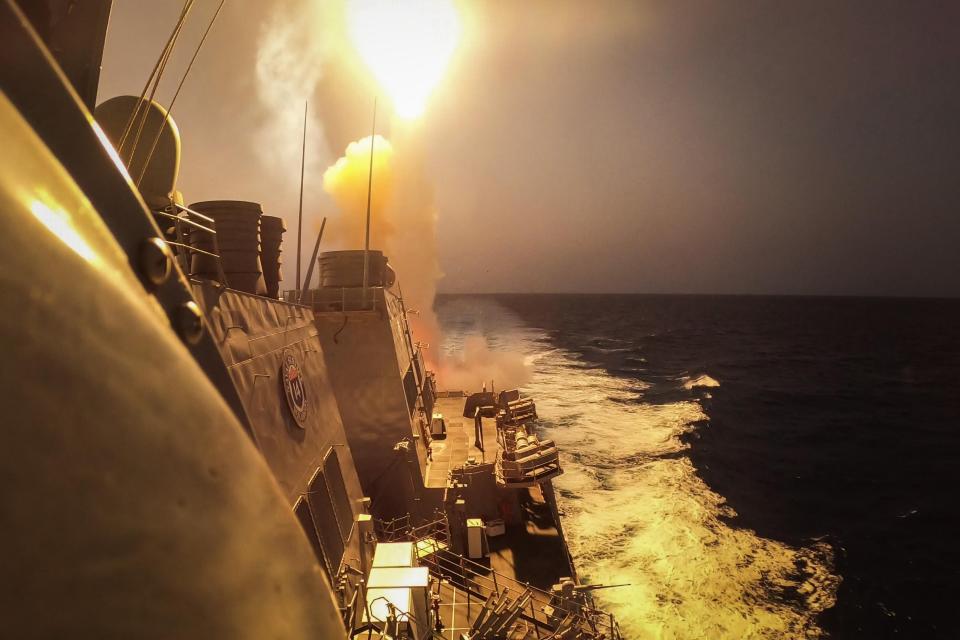Russia may arm Houthi rebels with advanced anti-ship missiles, report says
Russia is debating arming Yemen's Houthi rebels with anti-ship missiles, US intelligence has said.
It likely comes in response to Biden approving Ukraine's use of US weapons on Russian soil.
Russia has previously voiced its outrage over US and UK strikes on the Houthis.
Russia is weighing arming Yemen's Houthi rebels with advanced anti-ship missiles, US intelligence agencies have warned, according to The Wall Street Journal.
The move is likely in response to Biden quietly green-lighting Ukraine's use of US-supplied weapons on Russian territory, per the report.
Last month, Middle East Eye reported that Saudi Arabia had already talked Russia out of providing anti-ship cruise missiles to the Houthis. US officials now believe that Moscow is renewing its push to arm the rebels, The Journal reported.
The White House hopes to dissuade Russia from sending the arms by using a third country as an intermediary, the outlet added, citing unnamed US officials.
Russia has previously voiced its outrage over US and UK strikes against the Iran-backed Houthis, which began in response to the militant group's targeting of Red Sea shipping.
The group has attacked ships in the region with missiles and drones since October as part of a campaign that aims to put pressure on Israel and the West over the war in Gaza.
Between October 17 and the start of May, the Houthis attacked commercial vessels at least 53 times while threatening naval vessels in dozens of additional incidents, according to a Congressional Research Service report.
Kremlin spokesperson Dmitry Peskov said in January that Russia condemned retaliatory US and UK strikes on Yemen, saying they were "illegitimate" under "international law."
The Dwight D. Eisenhower Carrier Strike Group had fired more than 500 munitions in total against Houthi drones, missiles, and targets in Yemen as of May, as Business Insider previously reported.
Despite these efforts, there are concerns that the US isn't doing enough to combat such attacks.
One administration official told The Journal that US Central Command had been told to come up with more potential targets for future strikes.
Business Insider has reached out to both the US Department of Defense and Russia's Defense Ministry for comment.

The Houthis have already acquired a number of anti-ship munitions in the past.
The International Institute for Strategic Studies, a London-based think tank, said in a January report that Houthi forces have possessed anti-ship missiles "for almost a decade now, using them to harass military and commercial maritime traffic."
The rebels acquired their first anti-ship missiles in late 2014 and early 2015 when they took control of northern Yemen, the think tank report said.
These missiles included the nearly obsolete Soviet-era P-21 and P-22, as well as the Chinese C-801, it added.
"It is unclear if they remain operational or how many they possess," it continued. "More critically, though, the Houthi forces have gotten their hands on new, better equipment since those early acquisitions.
Cooperation between Russia and the Houthis is growing
Earlier this year, the Houthis reportedly said they would not target Russian or Chinese ships passing through the Red Sea and Gulf of Aden.
In March, Houthi political bureau member Ali al-Qahoum said there is "a constant cooperation and development of relations between Yemen, Russia, China, and BRICS states, as well as an exchange of knowledge and experience in various areas."
"This is necessary to drown America, the US, and the West in the mire [the crisis] around the Red Sea, to get them bogged down, weaken and become unable to maintain the unipolarity," he added.
Read the original article on Business Insider

